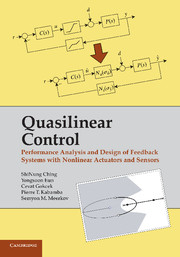 Quasilinear Control
Quasilinear Control Book contents
- Frontmatter
- Contents
- Preface
- 1 Introduction
- 2 Stochastic Linearization of LPNI Systems
- 3 Analysis of Reference Tracking in LPNI Systems
- 4 Analysis of Disturbance Rejection in LPNI Systems
- 5 Design of Reference Tracking Controllers for LPNI Systems
- 6 Design of Disturbance Rejection Controllers for LPNI Systems
- 7 Performance Recovery in LPNI Systems
- 8 Proofs
- Epilogue
- Abbreviations and Notations
- Index
- References
7 - Performance Recovery in LPNI Systems
Published online by Cambridge University Press: 01 June 2011
- Frontmatter
- Contents
- Preface
- 1 Introduction
- 2 Stochastic Linearization of LPNI Systems
- 3 Analysis of Reference Tracking in LPNI Systems
- 4 Analysis of Disturbance Rejection in LPNI Systems
- 5 Design of Reference Tracking Controllers for LPNI Systems
- 6 Design of Disturbance Rejection Controllers for LPNI Systems
- 7 Performance Recovery in LPNI Systems
- 8 Proofs
- Epilogue
- Abbreviations and Notations
- Index
- References
Summary
Motivation: The nonlinearities in sensors and actuators lead to performance degradation in LPNI systems as compared with linear ones. In this situation, two questions arise: (1) How can nonlinear instrumentation be selected so that the degradation is no more than a given bound? (2) Is it possible to modify the controller so that for a given nonlinear instrumentation, the linear performance is recovered? These questions motivate the subject matter of this chapter. Specifically, the first question leads to a method of partial performance recovery and the second to a complete performance recovery technique.
Overview: We develop techniques for both partial and complete performance recovery. Specifically, we show that the solution of the former is given by a Nyquist stability criterion-type technique (Section 7.1), while the latter is provided by the so-called controller boosting approach (Section 7.2).
Partial Performance Recovery
Scenario
In practice, control systems are often designed using linear techniques. In reality, control systems often (or, perhaps, always) include saturating actuators. The question arises: How large should the level of saturation be so that the performance predicted by linear design does not degrade too much? In this section, this question is addressed in the framework of the disturbance rejection problem.
- Type
- Chapter
- Information
- Quasilinear ControlPerformance Analysis and Design of Feedback Systems with Nonlinear Sensors and Actuators, pp. 204 - 224Publisher: Cambridge University PressPrint publication year: 2010


